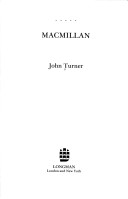Profiles In Power
1 total work
This is part of a wide-ranging series which provides critical studies of key political figures in world history since 1500. The books are not biographies, though inevitably they contain much biographical data; rather they are succinct interpretative essays analyzing the major features of the career within the context of its own time. Harold Macmillan (Foreign Secretary and Chancellor of the Exchequer under Eden until Suez, then Prime Minister 1957-63) presided over the dissolution of the British Empire and the first stages of irreversible economic decline. It was an unlucky end to a political career that had seen Britain's steady extinction as a Great Power. His ultimate reputation will depend on how posterity judges his understanding of these changes, and his skill in adapting himself and his country to meet them. This account of his career is a step towards a mature assessment.
Turner argues that Macmillan was more successful and farsighted that his recent reputation allows, but also that his "unflappable" image was the creation of a devious, highly strung political operator, who used his position in government ruthlessly to reinforce his party's dominant position in British politics. The study traces Macmillan's rise to influence under Churchill during World War II, and explores the origins and nature of his political ideas and political ambitions. It analyzes his adroit political manoeuvring after Suez, which destroyed Eden and allowed Macmillan to snatch the premiership for himself under the nose of his life-long rival R. A. Butler. It also assesses the achievements and failures of his premiership: the stop-go economic policies, the special relationship with the US, the decolonization process, and the first failed attempt of Britain to join the European Common Market. Short, analytical, and contextual, this book should serve both students (placing Macmillan in national and international politics) and specialists (with its judicious evaluation of a figure who is only now coming properly into historical focus).
Turner argues that Macmillan was more successful and farsighted that his recent reputation allows, but also that his "unflappable" image was the creation of a devious, highly strung political operator, who used his position in government ruthlessly to reinforce his party's dominant position in British politics. The study traces Macmillan's rise to influence under Churchill during World War II, and explores the origins and nature of his political ideas and political ambitions. It analyzes his adroit political manoeuvring after Suez, which destroyed Eden and allowed Macmillan to snatch the premiership for himself under the nose of his life-long rival R. A. Butler. It also assesses the achievements and failures of his premiership: the stop-go economic policies, the special relationship with the US, the decolonization process, and the first failed attempt of Britain to join the European Common Market. Short, analytical, and contextual, this book should serve both students (placing Macmillan in national and international politics) and specialists (with its judicious evaluation of a figure who is only now coming properly into historical focus).
